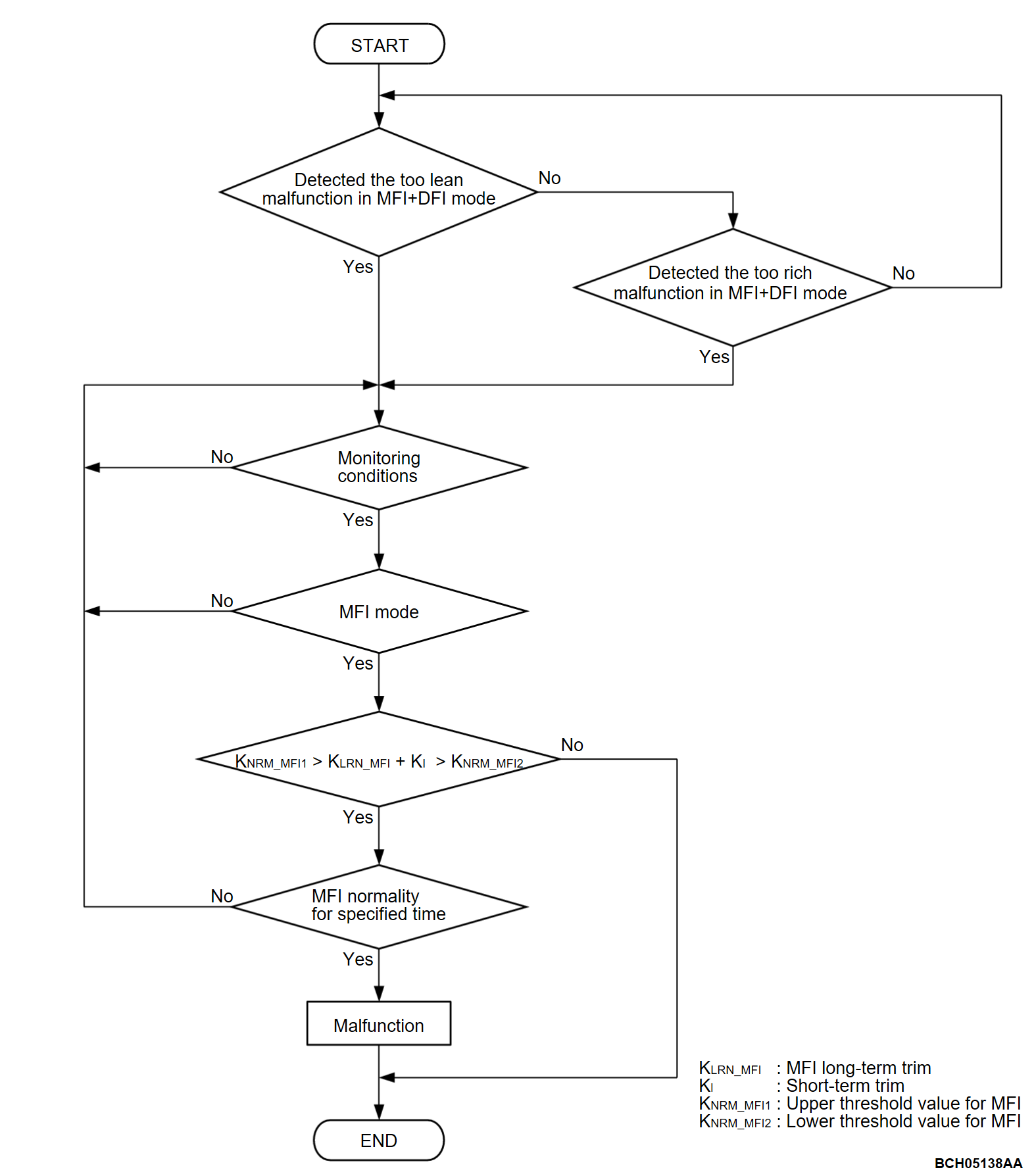DTC P129B: Fuel Trim (DFI)
TECHNICAL DESCRIPTION
The cause may mainly lie in an abnormally rich air-fuel ratio or abnormally lean air-fuel ratio, due to the poor injector (high pressure).
DESCRIPTIONS OF MONITOR METHODS
After too lean or rich (DTC P0171 or P0172) is detected at DFI and MFI mode, sum of MFI air fuel ratio feedback compensation values is monitored.
MONITOR EXECUTION
- Continuous
MONITOR EXECUTION CONDITIONS (Other monitor and Sensor)
Other Monitor (There is no temporary DTC set in memory for the item monitored below)
- Misfire monitor
Sensor (The sensor below is determined to be normal)
- Mass airflow sensor
- Engine coolant temperature sensor
- Intake air temperature sensor 1
- Barometric pressure sensor
- Throttle position sensor
- Manifold absolute pressure sensor
Check Conditions
- The malfunction of DTC P0171 or P0172 is detected in DFI and MFI mode.
- Engine coolant temperature is higher than 76°C (169°F).
- Under the closed loop air/fuel ratio control.
- Mass airflow sensor output is 9 g/sec or more.
- Fuel injection mode is MFI-mode.
- During the drive cycle, the ECM performs monitoring with the accumulated total time of 20 seconds.
Judgment Criterion
- Sum of MFI long-term fuel trim and short-term fuel trim is between 0.820 and 1.195.
FAIL-SAFE AND BACKUP FUNCTION
- None.
TROUBLESHOOTING HINTS (The most likely causes for this code to be set are:)
- Injector (high pressure) failed.
DIAGNOSIS
STEP 1. Using scan tool (M.U.T.-IIISE), read the diagnostic trouble code (DTC).
| caution | To prevent damage to scan tool (M.U.T.-IIISE), always turn the ignition switch to the "LOCK" (OFF) position before connecting or disconnecting scan tool (M.U.T.-IIISE). |
(1) Connect scan tool (M.U.T.-IIISE) to the data link connector.
(2) Turn the ignition switch to the "ON" position.
(3) Set scan tool (M.U.T.-IIISE), read the DTC.
(4) Turn the ignition switch to the "LOCK" (OFF) position.
Is the DTC P0171 or P0172 set?
STEP 2. Check the injector (high pressure).
STEP 3. Check high-pressure fuel line.
By a visual inspection and odor inspection, check around the high-pressure fuel line from the fuel pump (high pressure) to the injector (high pressure). Ensure that there is not fuel seepage and fuel leaks.
Are there any abnormalities?
STEP 4. Check the trouble symptoms.
(1) Carry out test drive with the drive cycle pattern. Refer to Diagnostic Function - OBD-II Drive Cycle - Pattern 8  .
.
 .
.(2) Check the diagnostic trouble code (DTC).
Is DTC P129B set?
![[Previous]](../../../buttons/fprev.png)
![[Next]](../../../buttons/fnext.png)


